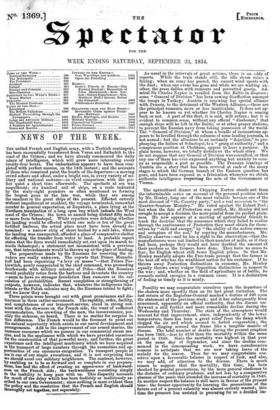NEWS OF. THE WEEK.
Tin united French and English army, with a Turkish contingent, has been successfully transferred from Varna and Baltschik to the coast of the Crimea ; and we have already commenced the daily relays of intelligence, which will grow more interesting every twenty-four hours. The embarkation appears to have been com- pleted with perfect success, on the 14th instant; and the accounts of those who remained paint the bustle of the departure—a moving crowd ashore and afloat, under a bright sun, in every variety of mi- litary and national costume—in vivid comparison with the per- fect quiet a short time afterwards. The spectacle at sea was magnificent; six hundred sail of ships, on a scale indicated by the sixty-eight pounders so often mentioned as forming the largest guns in the late war, while they are among the smallest in the great ships of the present. Effected entirely without impediment or accident, the voyage terminated, somewhat counter to general expectation, at Eupatoria, a place lying at the Northern termination of a long open bay which indents the West coast of the Crimea; the town so named being distant fifty miles or more from Sebastopol. While reporters were debating whether the landing would be effected within one mile or ten of the great fortified harbour, the actual place must have been already de- termined: a narrow strip of shore backed by a salt lake, where the landing was unexpected, afforded a place of comparative shelter for effecting the transfer from water to land. A probable report states that the force would immediately set out upon its march to- wards Sebastopol; a statement not inconsistent with a previous one, that intrenohments would-be thrown up at the place of landing.
The preparations made by the Russians for receiving the in- vaders are really unknown. The reports that Prince Mensal- koff had been organizing "a levy en masse "—that Prince Pas- kiewitch, newly reappointed to the chief command, was proceeding Southwards with military colonies of Poles—that the Russians would probably retire from the harbour and devastate the country —seem to have no stronger foundation than rumours or the cal- culation of probabilities. Recent completion or strengthening of outposts, however, indicates that, whatever the indigenous inha- bitants or the Polish colonies may do, the Russians intend to fight ; and we know they can. Three points were brought out with great prominence and dis- tinctness in these earlier movements. The rapidity, order, facility, and completeness of our transport-service, stand in strong con- trast with the slowness on the French side, the want of sufficient accommodation, the crowding of the men, the inconvenience, pos- sibly the sickness, on board. There is no matter for surprise in this difference. The French would be the foremost to point out the natural superiority which exists in our naval development and arrangements. Add to the improvement of our armed marine, the immense resources which we possess in our commercial steam ma- rine, and in the appliances with which we have provided ourselves for the construction of that powerful navy, and further, the great experience and the intelligent machinery which we have acquired in the transport of large numbers through the necessities and op- portunities of our enormous emigration. To transport people at sea is one of our staple avocations, and it is not surprising that we should excel our military neighbours. The contrast, however, by enabling us to be so forward and so complete in our prepara- tions, has had the effect of creating an appearance of backward- Fess on the French side; the backwardness consisting simply In the inability to keep pace with us. This disparity accounts for much of the delay which has been foolishly or maliciously as- cribed to our own Government; since nothing is more evident than the policy and the resolution that the French and English should thoroughly act together, not separately.
As usual in the intervals of great actions, there is an eddy of reports. While the train stands still, the idle steam raises a fizzing; when an army has passed, the vacant wind sports with the dust; when one event has gone and while we are waiting an- other, the press dallies with rumours and perverted gossip. Ad- miral Sir Charles Napier is recalled from the Baltic in disgrace ; some "General of Division "has been sowing disaffection amongst the troops in Turkey; Austria is renewing her special alliance with Prussia, to the detriment of the Western Alliance,—these are the principal rumours, more or less inarticulate. It does not ap- pear to be known as yet whether Sir Charles Napier is coming back or not. A part of the fleet, it is said, will return; but it is evident to common sense, without any official " disclosure," that enough ships will be left in the Baltic, or at other proper stations, to prevent the Russian navy from taking possession of the world. The "General of Division,' at whom a bundle of insinuations ap- pears to be levelled through the columns of some leading journals, is not named ; but the allusions to an untimely "dejection," to pro- phesying the failure at Sebastopol, to a "grasp at authority," and a conspicuous position at Chobham, appear to have a purpose. In plain terms, however, we totally disbelieve the whole story. We do not suppose that any General of Division was consulted, or that any one of them has ever expressed anything but anxiety to occu- py as responsible a post as possible. The Prussian leanings of Austria are a story that has been revived at each of the many stages to which the German branch of the Eastern question, has gone, and have been exposed as a fabrication whenever we obtain authentic intelligence respecting the acts of the Government at Vienna.


























